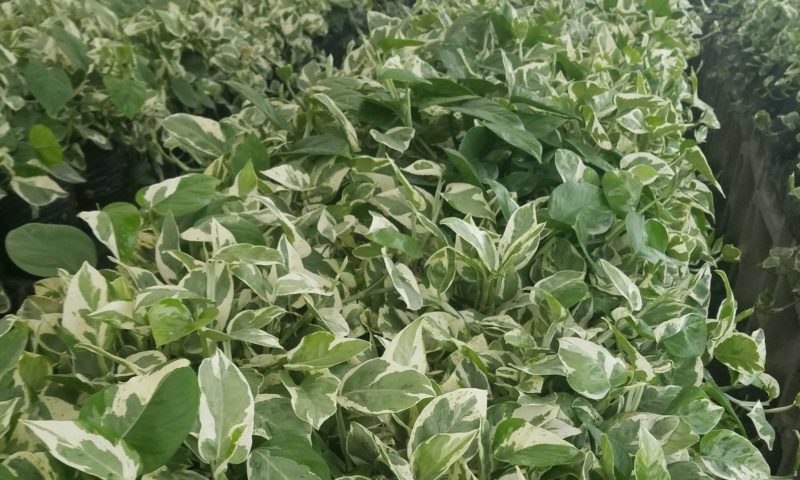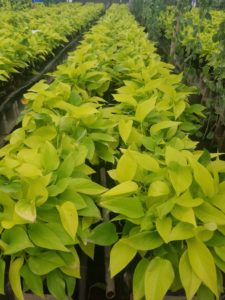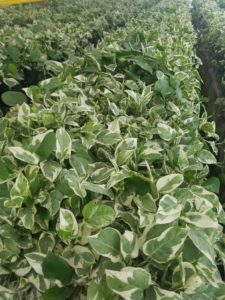
Let’s Talk Tropical Foliage Vines
Who among us has never owned a pothos plant? I believe you won’t find too many that haven’t had one in their home at some point, whether as a child, or currently as an adult. Pothos are part of a wide variety of tropical vines commonly produced for our industry. All in the family Araceae are scindapsus, epipremnum and philodendron. They encompass a wide variety of leaf sizes, shapes and colors. You can find them used in baskets, pots, and the spiller parts of combos. The holiday season wouldn’t be complete without ‘Hawaiian’ pothos or marble queen spilling out of your poinsettia bowls!
SCINDAPSUS AND EPIPREMNUM
 There are not a lot of distinguishable differences between scindapsus or epipremnum. The most specific difference is that scindapsus produce one ovule in each ovary and eprimenum will have multiple. Our industry has been using these two genera interchangeably. Some of the most commonly known varieties are ‘Hawaiian’ pothos, ‘Pearls and Jade’, ‘Jade’, ‘Marble Queen’ and Neon as well as ‘Pictus’, ‘Pictus Silvery Ann’ and ‘Pictus Silver Splash’. Depending on your needs, you have variations of color from green to white to yellow. Until I moved to Florida, I had no idea that an outdoor-grown pothos can quickly grow into a
There are not a lot of distinguishable differences between scindapsus or epipremnum. The most specific difference is that scindapsus produce one ovule in each ovary and eprimenum will have multiple. Our industry has been using these two genera interchangeably. Some of the most commonly known varieties are ‘Hawaiian’ pothos, ‘Pearls and Jade’, ‘Jade’, ‘Marble Queen’ and Neon as well as ‘Pictus’, ‘Pictus Silvery Ann’ and ‘Pictus Silver Splash’. Depending on your needs, you have variations of color from green to white to yellow. Until I moved to Florida, I had no idea that an outdoor-grown pothos can quickly grow into a
large vine with leaves up to 2 feet in length!
Scindapsus/epipremnum in general prefer a little bit of shade, but ‘Hawaiian’ pothos can tolerate full sun. The coloration of the plants will be much better with 30 to 50% shade. All these varieties are fairly easy to grow with minimal issues.
The most common issues these plants will face will be Phytophthora root rot, bacterial wilt and Rhizoctonia. Phytophthora can be identified by the loss of roots as well as the leaves turning from brown to black. When the issue is Phytophthora, the veins and the stems do not turn black if there is an infection. For bacterial wilt, you guessed it, the leaves will typically wilt. The stems and veins will turn black. If you place an infected cut stem into water, you will typically see the bacteria ooze from the stem into the water. When your issue is Rhizoctonia, you will typically see dark and necrotic spots on the leaves for aerial and for root infections the plants will usually turn dark brown and die. These issues can be relatively easily controlled with proper sanitation and a preventative spray rotation.
PHILODENDRON
There are many types of philodendron in the market. For today, we are going to focus on the vining types. Some of the main vining types are philodendron ‘Brasil’, ‘Cordatum’, and ‘Cordatum Lemon Lime’. These, similar to the above, have a variety of colors to their leaves with green and yellow. Although they are relatively simple to produce, they can have similar problems to the scindapsus/epipremnum. The main things to watch out for are bacteria leaf spot, Pythium root and stem rot, and Southern Blight. All of these wonderful vines are found to be tasty to aphids, mealybugs, snails and slugs. Occasionally you can also find thrips as well. Maintain an active scouting program to keep these issues under control.
PLANTING GUIDELINES
 The production of these vary based upon the pot size that they are being produced in. The table above gives some guidelines for plants per pot as well as average grow times. These crop times need to be adjusted based upon
The production of these vary based upon the pot size that they are being produced in. The table above gives some guidelines for plants per pot as well as average grow times. These crop times need to be adjusted based upon
your local environments.
As you can find these plants in every box store, garden center and often grocery stores, there clearly is a large demand for these plants. They definitely should be considered as part of your overall mix of production.


 Video Library
Video Library 




















